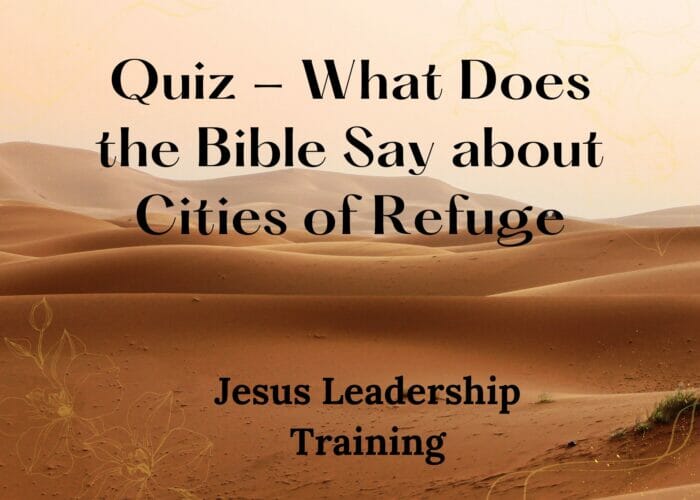15 Multiple choice questions ( with 4 Possible Answers) on the topic What Does the Bible Say about Cities of Refuge
- What type of people did God instruct the Israelites to provide cities of refuge for?
A. People who had committed a crime
B. People who were persecuted
C. People from a neighboring country
D. People who were homeless - What did God command the people of Israel to do with the cities of refuge?
A. Destroy them
B. Occupy them
C. Donate to them
D. Set them apart - How many cities of refuge were there in the land of Israel?
A. 6
B. 8
C. 10
D. 12 - What were the cities of refuge to be used for?
A. To provide shelter and protection
B. To serve as a place of judgment and retribution
C. To provide a place of rest
D. To serve as a place of worship - What type of protection did the cities of refuge provide?
A. Protection from enemies
B. Protection from false accusations
C. Protection from prosecution
D. Protection from the law - What did the cities of refuge provide to someone who had killed someone accidentally?
A. Sanctuary
B. Justice
C. A trial
D. Mercy - Who had the right to decide who could live in the cities of refuge?
A. God
B. The High Priest
C. The King
D. The Judges - What did the Law of Moses require a person to do before they could enter a city of refuge?
A. Make a sacrifice
B. Make a confession
C. Make an offering
D. Make an oath - Who were allowed to live in the cities of refuge?
A. Men
B. Women
C. Children
D. All of the above - How long could a person stay in the city of refuge?
A. Until the death of the high priest
B. Until the death of the person responsible for the death
C. Until the death of the king
D. Until the death of the victim’s nearest relative - What did a person have to do to be allowed to stay in the city of refuge permanently?
A. Make an offering
B. Take an oath
C. Prove innocence
D. Pay a fine - What did a person have to do to be allowed to leave the city of refuge?
A. Make a confession
B. Make an offering
C. Take an oath
D. Wait for the death of the victim’s nearest relative - What happened if a person left the city of refuge before their time was up?
A. They would be killed
B. They would be punished
C. They would be allowed to return
D. They would be exiled - What was the punishment for someone who killed another person intentionally?
A. Exile
B. Death
C. Imprisonment
D. Fines - What was the punishment for someone who killed another person accidentally?
A. Exile
B. Death
C. Imprisonment
D. Banishment to a city of refuge
Answers to Above Questions with Description
- A. People who had committed a crime- God instructed the Israelites to provide cities of refuge for people who had committed a crime.
- D. Set them apart- God commanded the people of Israel to set apart the cities of refuge.
- A. 6- There were 6 cities of refuge in the land of Israel.
- A. To provide shelter and protection- The cities of refuge were to be used to provide shelter and protection.
- B. Protection from false accusations- The cities of refuge provided protection from false accusations.
- D. Mercy- The cities of refuge provided mercy to someone who had killed someone accidentally.
- D. The Judges- The judges had the right to decide who could live in the cities of refuge.
- D. Make an oath- The Law of Moses required a person to make an oath before they could enter a city of refuge.
- D. All of the above- Men, women and children were allowed to live in the cities of refuge.
- D. Until the death of the victim’s nearest relative- A person could stay in the city of refuge until the death of the victim’s nearest relative.
- C. Prove innocence- A person had to prove their innocence in order to be allowed to stay in the city of refuge permanently.
- D. Wait for the death of the victim’s nearest relative- A person had to wait for the death of the victim’s nearest relative in order to be allowed to leave the city of refuge.
- B. They would be punished- If a person left the city of refuge before their time was up, they would be punished.
- B. Death- The punishment for someone who killed another person intentionally was death.
- D. Banishment to a city of refuge- The punishment for someone who killed another person accidentally was banishment to a city of refuge.


